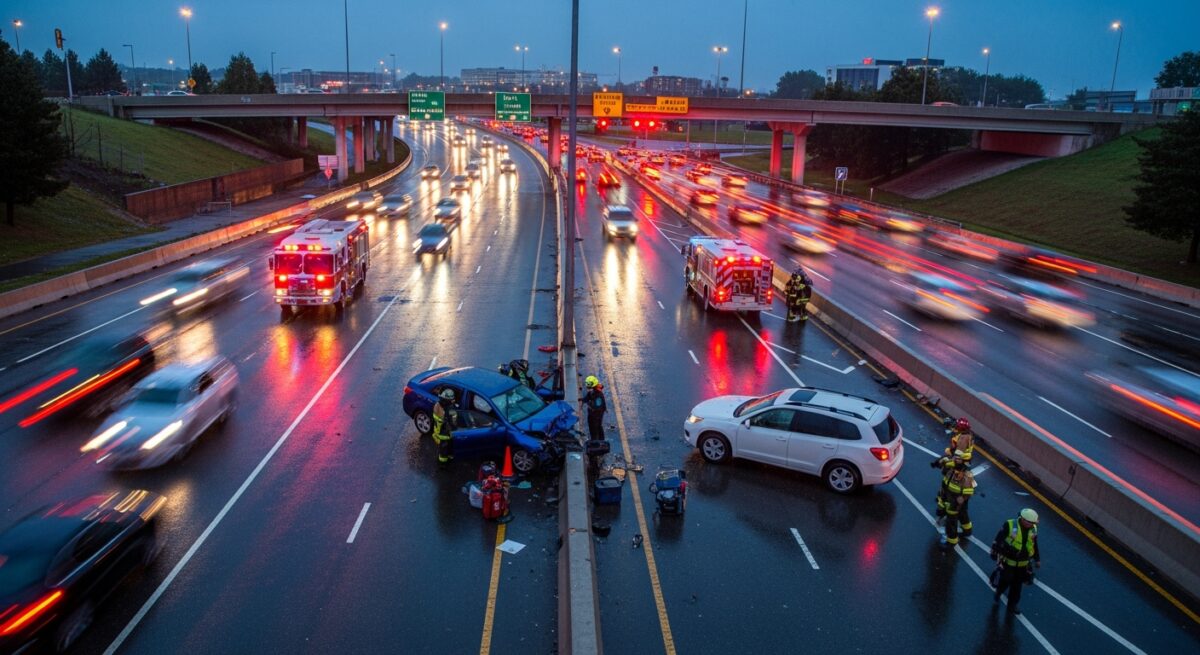What Questions to Ask After a Motor Vehicle Accident – A Quick Guide

After a motor vehicle accident, the aftermath can be chaotic, making it essential to ask the right questions to clarify the situation and ensure safety and legal protection. Knowing the questions to ask after a motor vehicle accident is crucial for the outcome of any claims or legal actions that may arise.
What Immediate Questions Should You Ask After a Motor Vehicle Accident?
Gathering information is vital after an accident. Here are some key questions to consider:
Who was involved in the accident?
- Identify all parties, including drivers, passengers, and witnesses.
- Collect names, contact information, and insurance details for future claims.
What happened during the accident?
- Document the sequence of events and note road conditions and weather.
- Understanding the accident helps establish fault later on.
Is anyone injured?
- Check for injuries and call emergency services if necessary.
- The NHTSA reported over 2.7 million injuries from crashes in 2020, emphasizing the need for prompt medical attention.
Have you contacted the police?
- Reporting the accident is essential, especially with injuries or significant damage.
- A police report serves as an official record for insurance claims.
What are the next steps?
- After ensuring safety, consider contacting your insurance company or seeking legal advice.
- Being proactive can help you navigate the aftermath effectively.
Key Information to Gather from Other Parties Involved
After a motor vehicle accident, it’s common to feel overwhelmed, but asking the right questions can significantly influence the outcome of your case. Gathering essential information is crucial for establishing facts, protecting your rights, and facilitating the claims process. Here are key areas to focus on:
Contact Information
- Full name of the other driver(s)
- Phone number and email address
- Insurance company name and policy number
- License plate number and VIN
Collecting contact information is vital for following up on claims or legal actions. Ensure this information is recorded clearly for your insurance company and any potential legal proceedings.
Witness Information
- Names and contact details of witnesses
- Statements from witnesses about what they observed
Witnesses can provide unbiased accounts that are crucial for determining fault. Politely ask for their contact information and if they can provide a statement to strengthen your case.
Accident Details
- Time and location of the accident
- Weather conditions
- Description of events leading up to the accident
Documenting specifics is essential. Take notes and photos of the scene, including vehicle positions and visible damages. With nearly 6 million car accidents occurring annually in the U.S., accurate documentation is critical for reconstructing the incident. By gathering this information, you can navigate the aftermath of an accident more effectively.
Understanding Your Insurance Coverage: Questions to Consider
After a motor vehicle accident, understanding your insurance coverage is essential. Asking the right questions can significantly influence your claim’s outcome and ensure you receive the compensation you deserve. Here are some key questions to consider regarding your insurance coverage.
What Type of Coverage Do I Have?
- Liability Coverage: Covers damages to other vehicles and medical expenses for others if you are at fault.
- Collision Coverage: Pays for damages to your vehicle regardless of fault.
- Comprehensive Coverage: Covers non-collision incidents like theft or natural disasters.
In 2020, about 77% of drivers had liability insurance, yet many were unaware of their policy limits and exclusions. Knowing your coverage type is crucial after an accident.
What Are My Deductibles?
- High Deductible: Lower premiums but higher out-of-pocket costs when filing a claim.
- Low Deductible: Higher premiums but lower costs when making a claim.
Your deductible is the amount you pay before insurance coverage kicks in. Understanding this can help you prepare financially after an accident.
How Do I File a Claim?
- Contact Your Insurer: Report the accident promptly.
- Gather Documentation: Collect police reports, photos, and witness statements.
- Follow Up: Track your claim status and required documentation.
Filing a claim can be complex, but knowing the steps can simplify the process. Approximately 30% of claims are delayed due to incomplete information, so being prepared is key.
Legal Questions to Ask Post-Accident
After a motor vehicle accident, asking the right questions is essential to understand your legal rights and responsibilities. This knowledge can help you navigate the aftermath, including insurance claims and potential legal actions. Here are some key legal questions to consider post-accident.
1. What are my rights as an accident victim?
- Knowing your rights is crucial. You have the right to seek compensation for damages, medical expenses, and lost wages. Familiarize yourself with local personal injury laws, as they can vary by state. Approximately 4.4 million people are injured in car accidents annually in the U.S., making this knowledge vital for recovery.
2. Should I contact a lawyer?
- Consulting a personal injury attorney is often advisable, especially if there are significant injuries or disputes about fault. Many lawyers offer free consultations, allowing you to assess your situation without financial commitment.
3. What evidence should I collect?
- Collecting evidence is vital for supporting your claim. This includes photos, witness statements, and police reports. Keeping a record of medical treatments and expenses is also crucial for legal proceedings or insurance claims.
4. How will my insurance policy affect my claim?
- Understanding your insurance coverage is essential. Review your policy to know what is covered, as this can influence your claim approach and expected compensation. Be aware that insurance companies often aim to minimize payouts.
Follow-Up Questions for Medical and Emotional Well-Being
After a motor vehicle accident, prioritizing your health and emotional well-being is essential. While immediate concerns often focus on physical injuries and insurance claims, long-term effects can be significant. Knowing the right questions to ask can help you navigate your recovery effectively. This section outlines key follow-up questions addressing both medical and emotional aspects of your well-being.
Medical Follow-Up Questions
- What are the recommended follow-up appointments?
Staying on top of your medical care is vital. Ask your doctor about necessary follow-up visits to monitor your recovery. - Are there specific symptoms I should watch for?
Knowing what symptoms to look out for can help catch complications early. Your healthcare provider can provide a list of concerning signs. - What treatment options are available for my injuries?
Understanding your treatment options empowers you to make informed decisions about your recovery.
Emotional Well-Being Questions
- How can I manage stress and anxiety post-accident?
Emotional distress is common after a traumatic event. Inquire about coping strategies or resources like counseling. - Should I consider speaking with a mental health professional?
If overwhelmed, a mental health professional can offer valuable support. Ask for recommendations. - What signs indicate that I might need further emotional support?
Being aware of emotional distress signs can help you seek help sooner. Discuss these with your healthcare provider.
Conclusion
Asking the right questions after a motor vehicle accident is crucial for your recovery. Nearly 40% of accident survivors experience PTSD, highlighting the importance of addressing both physical and emotional health. By being proactive and informed, you can navigate your recovery more effectively.
FAQs: Questions to Ask After a Motor Vehicle Accident
What to ask for when in a car accident?
Ask for the other driver’s name, contact information, insurance details, and vehicle registration. Also, request contact info from any witnesses and take photos of the scene.
What to ask the insurance company after an accident?
Ask about your claim status, what coverage applies, what documentation they need, and how the settlement process works. Clarify any deadlines or next steps.
What not to say to insurance after an accident?
Avoid admitting fault, giving detailed or speculative statements, or agreeing to quick settlements without fully understanding your rights and damages.
How to negotiate with insurance company after car accident?
Be clear about your damages, keep records of medical bills and repairs, and don’t accept the first offer. Consider consulting an attorney for guidance and stronger negotiation.
Final Thoughts
Knowing the right questions to ask after a motor vehicle accident can protect your rights and ensure a smoother claims process. Stay calm, gather information carefully, and communicate thoughtfully with insurance companies. When in doubt, seeking professional legal advice can help you negotiate the best possible outcome.
Legal help is just one click or call away—visit LegalCaseReview.com or speak to an expert at 📞 (833) 279-1850.


